All Management Events
- WOMEN IN MACHINE LEARNING AND DATA SCIENCE September 26, 2019
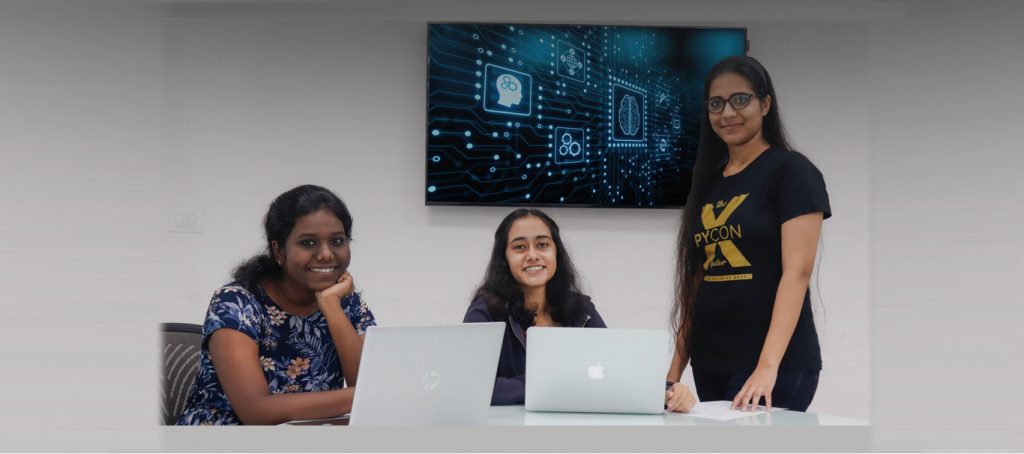
WiMLDS Amaravati Chapter at SRM AP founders: Sowjanya Naidu Nelli, Abirami Ravishankar and Aakanksha Chouhan
The Amaravati chapter of WiMLDS will work out of the SRM AP campus to provide support and promote women and gender minorities from the entire Amaravati region who are practicing, studying or interested in the field of machine learning and data science. The Amaravati chapter has the added distinction of having the youngest founding members of the worldwide WiMLDS network.
Abirami believes this initiative is important for several reasons, “Empowering women particularly from our region to pursue ML and AI irrespective of their tech/non-tech background, encourages diversity, economic growth, and equality across socio-economic backgrounds.”
WiMLDS has chapters in North America, Africa, Middle East, Europe, South Africa, Asia and Australia. The Amaravati chapter at SRM AP is the newest one in India.
“This organization (chapter) is looking to create opportunities for members to engage in technical and professional conversations in a positive, supportive environment by hosting talks by women and gender minority individuals working in data science or machine learning, as well as hosting technical workshops, networking events and hackathons.” says founder Aakanksha Chouhan.
The fields of Machine Learning and Data Science are growing exponentially both in real life applications and in academia. “Nature has always incentivized the human race when we observe accurate patterns in it,” says Sowjanya, “We used to call it ‘predictions’ till the 1950’s; now it goes by the name of Machine learning and Data Science.”
Aakanksha learned of this WiMLDS at PyCon Italy. “There I met members of WiMLDS from the Poland and Paris chapters. Subsequently, through the mentors at Next Tech lab we got to participate in a live talk session on ‘Women in ML & DS” conducted by Shubhi Sareen of Google Hyderabad who is also a member of WiMLDS Delhi. This led to a conversation with Erin Ledell, founder WiMLDS organization and the Bay Area chapter head and the subject of Amaravati came up and soon this chapter was established.
According to Aakanksha, Machine learning and more appropriately AI is forcing us away from simple and repetitive tasks towards solving real life problems and incubating new ideas. “The shift from ‘if I can’ to ‘how I can’ is exciting! And we can agree that these wonderful communities that exist have contributed immensely to push the human race forward and I’m happy to see that – we’re innovating!”
http://wimlds.org/about-the-amaravati-team/
Twitter : WiMLDS_AMVT
Instagram : wimldsamaravati
Women in Machine Learning and Data Science – 2019 Inauguration WiMLDS – Amaravati Chapter
Full Text – Jessie Papatolicas address
Continue reading → - NARL lab facilities proposed for collaborative multi-disciplinary research September 25, 2019
7th September 2019: Visiting dignitary, Dr. T. Narayana Rao, Sr. Scientist at NARL (National Atmospheric Research Laboratory at Gadanki, Department of Space described the research facilities at the lab and how academia and SRM AP faculty can share these resources to advance their research projects.
According to Dr. Rao, NARL is studying the erroneous GPS signals often caused by atmospheric changes, “NARL scientists are working on studying the atmospheric conditions by deciphering these flawed GPS signals. This is a necessary step as the accuracy of the readings and interpretation is crucial to assess atmospheric pressure, humidity, weather conditions while sending signals to ISRO launch pads.”
With regard to the specific research facilities at NARL, Dr. Rao spoke of the world’s second-largest phased array radar, the sophisticated radio, optical and acoustic instruments. These resources at NARL as well as access to the high-performance computing system of 1.5 Petaflop provides opportunities for academicians, scientists, research scholars and students in different disciplines including physics, chemistry, electronics, computer science and environmental science. Prof. Ranjit Thapa, Department of Physics says, “High-performance computing system deployed by computational researchers can solve critical research problems such as ‘self-healing materials’, ‘catalyst for CO2 and N2 reduction’, and ‘high energy density organic materials’.”
Dr. Rao further spoke of possible faculty participation in combined research studies on the surface and upper atmosphere using advanced MST radar and Lidars. Prof. D. Narayana Rao, Pro-Vice Chancellor highlighted that the central facility of NARL, access to advanced resources and equipment, and opportunity to submit projects in the globally recognized platform validates the importance of carrying out collaborative research with NARL.
Continue reading → - “WOMEN’S EMPOWERMENT IS AN ISSUE THAT CROSSES ALL SOCIO ECONOMIC BOUNDARIES.” September 23, 2019
Speaking on the subject of women’s empowerment and gender biases in all walks of life, Member of Parliament, Meenakshi Lekhi made it a point to explain how the notion applies not only to those who have succeeded in specialised careers like space research.
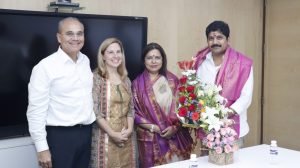 “Empowerment cannot be viewed from the narrow angle of haves and have nots. Women in power can also suffer from patriarchy. Empowerment means not having to depend on others, it is not linked to how one dresses or what one does for a living. It is about mental equality, knowing where you belong, how you express yourself, being self-assured, not letting external factors impede one’s growth and freedom.”
“Empowerment cannot be viewed from the narrow angle of haves and have nots. Women in power can also suffer from patriarchy. Empowerment means not having to depend on others, it is not linked to how one dresses or what one does for a living. It is about mental equality, knowing where you belong, how you express yourself, being self-assured, not letting external factors impede one’s growth and freedom.”On the subject of government programs that empower women directly (as individuals and responsible for their families), Ms. Lekhi drew the distinction between programs like ICDS (Integrated Child Development Services) and current programs like Ujjwala Yojana, Jan Dhan Yojna, Mudra Ayojana, and Awas Yojana where subsidies and financial assistance goes directly in the hands of women. “These programs demonstrate our trust in the capabilities of women to take care of themselves and their families. It is about helping the most vulnerable, providing help where it has not reached before.”
Continue reading →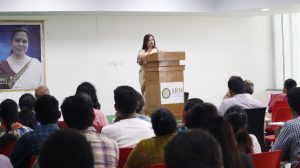 Ms. Lekhi is a Supreme Court of India lawyer. In July 2016, she was appointed as chairperson of the Committee on Privileges of the Lok Sabha in Parliament. She was awarded the “Best Debut Women Parliamentarian” award by Lokmat in 2017. She has led the debate on a wide variety of matters such as bails, trials, appeals, criminal writs, the Prevention of Corruption Act/Customs Act/FERA prosecutions, domestic violence and Family Law dispute. Lekhi has been a part of the Drafting Committees for Bills like “Women’s Reservation Bill” and “Sexual Harassment of Women at Workplace (Prevention, Prohibition and Redressal) Bill”. She also played an active role in the drafting of the Criminal Law (Amendment) Bill, 2013 which provided for amending the existing laws related to sexual violence. She has been in the National Commission for Women’s (NCW) special Committee, and Chairperson of Special Task Force on Women Empowerment Association.
Ms. Lekhi is a Supreme Court of India lawyer. In July 2016, she was appointed as chairperson of the Committee on Privileges of the Lok Sabha in Parliament. She was awarded the “Best Debut Women Parliamentarian” award by Lokmat in 2017. She has led the debate on a wide variety of matters such as bails, trials, appeals, criminal writs, the Prevention of Corruption Act/Customs Act/FERA prosecutions, domestic violence and Family Law dispute. Lekhi has been a part of the Drafting Committees for Bills like “Women’s Reservation Bill” and “Sexual Harassment of Women at Workplace (Prevention, Prohibition and Redressal) Bill”. She also played an active role in the drafting of the Criminal Law (Amendment) Bill, 2013 which provided for amending the existing laws related to sexual violence. She has been in the National Commission for Women’s (NCW) special Committee, and Chairperson of Special Task Force on Women Empowerment Association. - “Cost is the factor that connects all the dots.” Dr.Rajendran on the future of bioenergy September 7, 2019
“The Intergovernmental Panel on Climate Change (IPCC) suggests the temperature rise should be limited to 1.5°C by the end of this century for the world to survive, “says Dr. Karthik Rajendran, Assistant Professor, Department of Environmental Science. “For this, we need to reduce the emission by almost 50% of 2010 levels.” He further points out that while we may produce electric cars instead of petrol cars, electricity from solar and wind instead of coal, natural gas biologically as biogas instead of shale gas one question is at the center of these technologies – cost.
Dr. Rajendran’s quest to understand the factors influencing commercial viability of bioenergy systems began in Chennai during his bachelors’ thesis on hydrogen production leading subsequently to numerous lab simulations to understand the bottlenecks of commercialization.
On techno-economic analysis as an early indicator of commercial viability
Techno-economic analysis is an examination of various specifications of the technology at its inception stage when it is merely an experiment in a conical flask. “We analyze components on basis of all aspects of technology, economic feasibility, environmental sustainability, market realization and social integration. We can identify bottlenecks early on that hasten the technology out of the laboratory towards commercialization. This enables us to more accurately predict the fate of bioenergy/bio-based product developed out of laboratory.”
The role of institutional and government support
“In my Masters studies at UB Sweden I realized not all technologies being developed in labs are successful and that economics is not the only component that hinders commercialization. We need good institutional and governmental policy, including technical support, to advance such clean energy systems. This is when I started working on integrating technology, economics, and government policy. I compared different European technologies including biogas, electric cars, solar, and wind to understand the role of state/government subsidies towards green technology development. What I found was that electric car technologies for example do little to prevent C02 emissions, yet they receive more incentives from the government compared with other renewable energy systems. It’s about the source of electricity. Be it coal or wind plant if it’s not a green electricity source it is not a green vehicle.”
The science of energy waste conversion
Dr. Karthik Rajendran’s initial research on bioenergy production from waste looked specifically at hydrogen from algae. He currently focuses on bioenergy with carbon capture and utilization with the cost factor being the main parameter. Dr. Rajendran explains how this works. “For example, due to long term storage issues excess solar or wind energy spills over and is wasted. This excess electricity is converted to hydrogen through electrolysis. Then the hydrogen can be combined with CO2 from a bioenergy system to produce methane. This is known as Sabatier reaction. In Europe this research is happening with an aim to convert existing gas grids to a green gas grid by 2050.”
Several of Dr. Rajendran’s published papers examine electro fuels, circular bio economy and techno-economic analysis.
Continue reading → - SRM University, AP – Amaravati celebrates Founder’s Day September 4, 2019
Organises a Blood donation camp to honour Founder’s vision to serve the community
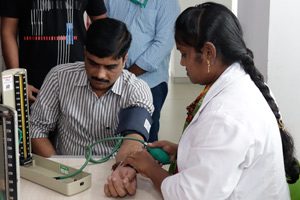
Amaravati, August 24th 2019: SRM University, AP – Amaravati celebrated Founder’s Day by organizing a blood donation camp. More than 120 college students and faculty have donated blood in the camp of which several were first time donors.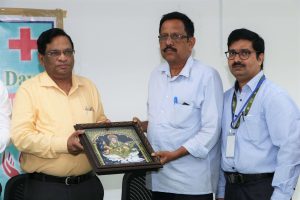 On this occasion, Prof. D. Narayana Rao, Pro Vice Chancellor, SRM University, AP-Amaravati presided over the program and shared the Founder and Chancellor, Hon’ble Member of Parliament, Dr. T.R. Paarivendhar’s vision and generous contributions to the society through various social services activities. “21 educational institutions have been established by SRM management under the leadership of Dr. Paarivendhar and till date around 1.10 lakhs students have passed out from different educational streams. Our Founder’s vision is to provide education to all and has therefore provided scholarships to the tune of Rs. 35 crore till date to the underprivileged sections of the society. The SRM institutions have more than 7,000 employees and 70,000 students currently.” shared Prof. Rao.
On this occasion, Prof. D. Narayana Rao, Pro Vice Chancellor, SRM University, AP-Amaravati presided over the program and shared the Founder and Chancellor, Hon’ble Member of Parliament, Dr. T.R. Paarivendhar’s vision and generous contributions to the society through various social services activities. “21 educational institutions have been established by SRM management under the leadership of Dr. Paarivendhar and till date around 1.10 lakhs students have passed out from different educational streams. Our Founder’s vision is to provide education to all and has therefore provided scholarships to the tune of Rs. 35 crore till date to the underprivileged sections of the society. The SRM institutions have more than 7,000 employees and 70,000 students currently.” shared Prof. Rao.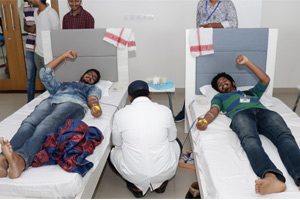 The University’s NSS division organised a blood donation camp together with the international Red Cross society. This was in line with the Founder’s vision to serve the community.
The University’s NSS division organised a blood donation camp together with the international Red Cross society. This was in line with the Founder’s vision to serve the community.“SRM Management is spending generously for the welfare of the underprivileged people.”, commented, D. Gunasekaran, Registrar, SRM University, AP – Amaravati. The Registrar also motivated and thanked the students by emphasising that blood donation is a big contribution towards the welfare of the society.
Dr. Lakshmi Rajyam, University Medical Officer, SRM University AP-Amaravati encouraged the students and staff to donate blood and explained, “A healthy body is capable of regenerating the blood donated in a few weeks’ time. India needs about 5 crore units of blood annually but has only 2.5 crore units available. This deficit can only be bridged if everyone comes forward to donate.”
Present for this celebration were – ProVC, Registrar, Deputy Registrar, University Medical Officer – Dr. Lakshmi Rajyam and Red Cross Guntur District incharge, Mr. Narasimha Rao along with faculty and students.
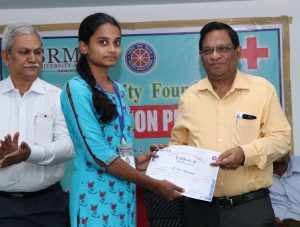 At this occasion, 20 NSS students were awarded certificates for their remarkable contributions to the community. The University got together and cut a cake to mark Founder’s Day.
At this occasion, 20 NSS students were awarded certificates for their remarkable contributions to the community. The University got together and cut a cake to mark Founder’s Day.Video Link: https://www.youtube.com/embed/ZHih6PGfI-0
Continue reading → - C Durga Rao September 3, 2019
- URC backs computational & experimental research. New R&D collaborations proposed August 27, 2019
Amaravati, 7th August 2019: At the University Research Council meeting held on campus, and presided by Dr. P. Sathyanarayanan, Founder and President of the board, a renewed commitment was made to research of national significance such as energy conservation and sustainability.
An illustrious, distinguished and accomplished group of academicians and scientists provided direction and mentorship to the faculty members and research scholars. The council comprises Prof K. Satyanarayana – Director, IIT Tirupati, Prof. U.B. Desai – Director, IIT Hyderabad, Prof. P. Appa Rao – Vice Chancellor, University of Hyderabad, Prof. Gautam R. Desiraju – IISc, Bangalore, Dr. S.R. Rao – former Senior Adviser, Department of Biotechnology, Government of India, Prof. B.S. Murthy – IIT Madras, Chennai, Dr. Padmanabham – Director, ARCI, Hyderabad, Prof. B.V.R. Chowdari – Senior Executive Director, Nanyang Technological University, Singapore and Prof. D. Narayana Rao – Pro-Vice Chancellor, SRM University – AP, Amaravati.
The meeting commenced with an opening presentation by Prof. D. Narayana Rao, Pro-Vice Chancellor, SRM AP, Amaravati highlighting the areas of research currently undertaken and proposed to carry out by the University’s 107-member faculty. The Chairman of the Research Council, Dr. V. K. Saraswat – Member of NITI Aayog, addressed all the members through a video call and advised them on the need and development of research activities. Dr. Saraswat also highlighted the importance of aligning research programs with the national agenda.
Vice Chancellor, Dr. Jamshed Bharucha emphasised SRM AP Amaravati’s focus on societal impact through original research in an interdisciplinary environment. The new research lab building and the X-Labs will facilitate these initiatives. Faculty Members made presentations on the current as well as proposed research activities
The council commended the quantum and quality of work already done by SRM AP Amaravati in just two years of inception. Members pointed out that the kind of MOUs and collaborations effected with different organisations are crucial for the faculty to be able to sustain research. Specific appreciation was about Hydrogen Powered Train (Jal-Janak Rail) being developed in collaboration with Integral Coach Factory (ICF) of the Ministry of Railways, SRM-Amara Raja Center for Energy Storage Devices. Special mention was made to the sports science centre as it is often an overlooked area.
Prof. P. Appa Rao offered that the experimental facilities of University of Hyderabad can be accessed by the faculty members of SRM University-AP, Amaravati. Dr. Padmanabham invited the faculty members of SRM University-AP, Amaravati to establish collaborations with ARCI, Hyderabad and make use of the state-of-the art experimental facilities available at ARCI.
Commenting on the occasion, Dr. Kasthurirangan Gopalakrishnan, Associate Dean – Research said, “The inputs provided by the council have not only been encouraging but have also been extremely insightful. They have provided diligent inputs and guidance. Our faculty found this experience extremely motivating.”
Continue reading → - Dr. Shailender Swaminathan proposes overhaul in insurance and medical services in India’s healthcare sector. August 27, 2019
3rd August, 2019, Madras School of Economics, Chennai: The Chennai International Centre (an organization providing a platform for intellectuals and luminaries to share transformational ideas) invited an expert panel to talk on Indian Healthcare Services. The panel members comprising Dr. Shailender Swaminathan (Health Economist, Researcher, Associate Dean – SLABS, SRMU – AP, Amaravati), Dr. Keshav Desiraju (Former Health Secretary, Government of India), Dr. Soumya Swaminathan (Chief Scientist, WHO) discussed the significance of a holistic approach in the healthcare sector with moderator Dr. Nalini Krishnan, Director, REACH – Resource Group of Education and Advocacy for Community Health. Panelists addressed the inaccessibility of medical facilities in India stemming primarily from a lack of government funding, high cost of drugs and the low literacy rate. The panel also recognized how this inaccessibility leads to poor utilization of technology and low insurance penetration.
“How India is able to fund healthcare five years from now is of significance,” opined Dr. Shailender Swaminathan, citing the US healthcare system, “The U.S. aimed at funding healthcare services of people over 65 years through the contribution of younger citizen and taxpayers. This previously successful U.S. model is on the verge of failure as the cost of drugs increased at a higher pace exhausting the funds.”
Pointing out that policies must be directed towards reducing the poverty rate in India to suffice for increasing healthcare expenses, Dr. Swaminathan added that “High expenditure on healthcare services leaves no funds for purchasing basic consumption goods, further pushing citizens below the poverty line. “
He explained that insurance policies in India cover only hospitalization bills whereas outpatients (patients who do not require hospitalization) are unable to pay the daily medical expenses. This lack of outpatient insurance drives up insurance costs, as minor health issues are not treated, leading to eventual hospitalization of the patient.
According to Dr. Swaminathan an integrated approach towards healthcare would prompt the government to provide free diagnostic and treatment services of high quality to outpatients. The panel concluded that the government must focus on primary healthcare services, prevention of diseases, insurance inclusivity and healthcare promotion.
Healthcare panel in discussion: https://www.youtube.com/watch?v=ShU1nH1w0Fo
Continue reading → - How Interdisciplinary Education Hones Requisite Skills August 26, 2019
How Interdisciplinary Education Hones Requisite Skills For Entrepreneurs
In their study ‘A Multidisciplinary Approach to Creating the Entrepreneurial Mindset Amongst Graduates’, Angela Hamouda and Colman Ledwith strongly recommend this modern “reform” in education. The Dundalk Institute of Technology scholars assert that while entrepreneurs recognise opportunities, skills from interdisciplinary learning allow them to conceive, design and build ideas. Both types of skills complement each other.
It is now well established that entrepreneurship is the backbone of growing economies. It’s particularly true of India, which is seen as a land of opportunities all over the world. For our economy to flourish, we need more entrepreneurs, who give rise to successful and sustainable businesses. But for that to happen, future entrepreneurs will need to call upon skills that they can gain only through interdisciplinary education.
What do experts say?
A European Commission report read, “Traditional educational methods do not correlate well with the development of entrepreneurial traits and attributes and that interdisciplinary collaboration is an essential element of building enterprising abilities.” That belief has been supported and propagated not only by leading academic and researchers all over the world but industry practitioners and entrepreneurs too.
According to noted historian and academic Dr Patrick French, students with interdisciplinary education including Liberal Arts are more adept to problem-solving. Other experts assert that it promotes lateral and innovative ways of thinking, which are crucial for professionals and entrepreneurs of tomorrow. There are examples galore of Tech companies hiring professionals with some Liberal Arts backgrounds. Others have followed suit.
Building vital skills for entrepreneurs
In an interdisciplinary setup, students are exposed to varied perspectives and schools of thought. That enables them to approach a business issue from different angles as they look for solutions. It thus organically enhances their problem-solving skills, which is a vital ability for future entrepreneurs. It’s also important to realise that entrepreneurs are captains of their ships and have to take decisions, where they benefit immensely through this approach.
One of the most underrated entrepreneurial skills is creativity. While being a visionary and the appetite for risks are skills that are often touted, you can’t lose sight of creative skills, which will come into play a lot more in the fast-evolving and versatile world of entrepreneurship. But arguably the most important lesson of the interdisciplinary approach comes through the understanding of and interacting with minds from diverse backgrounds.
Entrepreneurs at the helm of matters might not necessarily have to lead teams directly, but they realize the benefits of getting the best from their personnel for business. The interdisciplinary approach encourages students to transcend boundaries of discipline and engage with peers from different backgrounds. That along with the other crucial skills can make for successful entrepreneurs of tomorrow.
Continue reading → - Ennovab: The Playground Of Next Unicorn August 13, 2019
Entrepreneurship at SRM Amaravati: Ennovab-The pulse of Engineering College
“It’s not about ideas. It’s about making ideas happen,” said Scott Belsky, Cofounder of Behance as he spoke of entrepreneurship. His wise words hold a lot of truth as it is often seen with brilliant minds that come up with exceptional ideas, which unfortunately don’t see the light of the day. They need honing, follow-up, and strategic execution.
Those exact words sum up the role of Ennovab at SRM University, Amaravati. The Entrepreneurial Innovation Lab is a student-led activity, which has fostered an ecosystem on campus that is shaping entrepreneurs who lead the way. Sowing the seeds of innovative and entrepreneurial thinking amongst students, it aims to take them closer to their business goals.
Silicon Valley work culture to Amaravati
Ennovab is the brainchild of Piyush Mitra K, Vatsal Rathod, Tuhin Sarkar and Aayushi Biswas, students of SRM University, Amaravati. During their semester abroad program at University of California, Berkeley, they realised the need for a student-led entrepreneurial lab back home to foster the startup culture, which has been at its peak in the Silicon Valley.
What followed were discussions with honorary delegates of Sutardja Centre for Entrepreneurship and Technology. Their guidance was complemented by the strong support the students received from the management of SRM University, Amaravati. That gave birth to Ennovab, which strives to imbibe the renowned business ethics of Silicon Valley.
What does Ennovab do?
In a short period, Ennovab has nurtured entrepreneurial dreams of teams that are now well on their way in their startup journeys. With innovation at the forefront, it’s not surprising that several of these startups have focused on Internet of Things, Artificial Intelligence as well as Extended Reality. That’s blending technology with entrepreneurship for best results.
But it all begins with the desire to add value to the world. New members of Ennovab driven by the goal are mentored through the various stages of startups – ideation, validation, market research, business model construction and finally, venture capitalist presentations. Case studies, brainstorming sessions are a common practice as Ennovab members meet.
Some of the other crucial aspects of the startup journey are networking and making pitches. Through Pitch Days and Founders speed dating events, Ennovab gives its members a taste of what to expect as they venture out into the world of entrepreneurs. Talks by startup heads and gurus, give them insights to navigate their challenging and exciting realm of startups.
India’s growing economy needs more entrepreneurs to take it to its pinnacle. With its activities, Ennovab is playing its part in the startup revolution in the country.
Continue reading →

